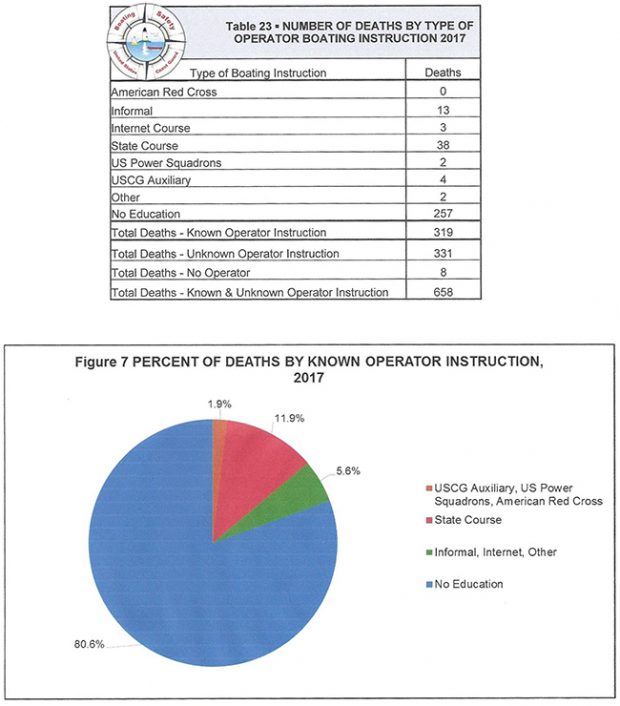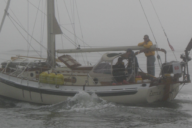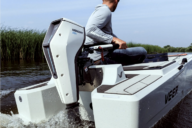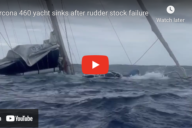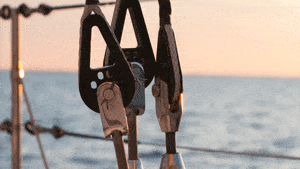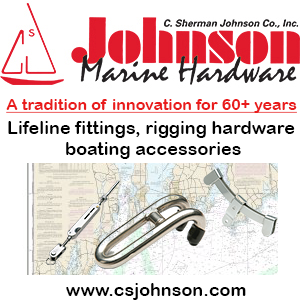In last week’s Just Cruising column, I posed the question of whether or not boat owners, skippers and sailors in general should be required to take some sort of safety and seamanship course and earn a certification. Cruising Compass readers certainly have their opinions on the topic as you will see below. Many thanks to all who took the time to write us. GD
Hi George:
My sailing club, Carlyle Sailing Association, has a rental boat fleet. We use it to attract new members. We screen renters based on experience. This year however the state of Illinois passed a new regulation requiring that rental companies, including CSA, require a mandatory safety course certificate. This is coming apparently from a national effort led by whom we can’t say. The funny thing is that the training does not have a “sailboat” component. When this was brought to the attention of the IDNR we were told, “Have them take the powerboat course”. So much for sailboats!
Mike Pitzer
___________________________________________________________________________________________________
George,
I’m responding to your survey/poll/request for comment. I’m vehemently opposed to the certification idea for several reasons:
* The state requirements are pitiful. They don’t even have an on-water portion! A friend’s son took the Maryland course, and on the day he took it he wasn’t sure of the sailboat/powerboat right of way rules. He said sailboats don’t always have right of way (correct), but couldn’t state the single time when that is true (overtaking, if you ignore the various rare exceptions like “constrained by draft” or “not under command”). But they do ensure you know how many minutes to run your bilge blower before starting the engine.
* The ASA certifications are outrageously expensive and nearly meaningless. They are designed to take a sailor from zero to certification in 5 days — and then it is good for life. So, even if you sort of might know something (but really, not much!) after 5 days, in 5 years you have none of those skills left. However, a person who has sailed all their life has to spend a few thousand dollars and a week of wasted vacation (yes, wasted — it doesn’t count as “fun” if you are doing lowest-common-denominator training and waiting while the other classmates take their turn at screwing up). Who would you trust to dock YOUR boat — a person who did it 3 times at an ASA course in nice weather at an easy pierhead, or a person who’s done it 500 times in the last decade, at all kinds of piers and all kinds of weather on a dozen different boats? There is no bypass route for a skilled sailor to get the certification — you start off with ASA 101 and go out on the water and “learn” how to raise a sail! And ASA has added a new revenue stream — while it is “for life” you have to join ASA and pay a renewal fee every few years (no verification, no training, no nothing — just pay your couple hundred and get the certification).
* What’s the purpose? Is there any research that indicates that the kind of training that could realistically be provided actually improves safety? While we all learned it a thousand years ago, how many 45 year old drivers can accurately cite the stopping distance from a school bus? If it is learn-test-forget, it’s pointless.
* Unlike cars, where the situation is rather homogeneous, boats are not. Sailboats are very different from power boats with an entirely different skill set, small boats are very different from big boats, little outboards are very different from huge engines, engineless boats (rowboats, small sailboats — or larger, like a Chesapeake Skipjack) are different yet. Basic rules of the road stuff could be helpful across the board, but if you had anything more, it would be wildly inappropriate for much of the class.
* A pet peeve of mine with the state license is definitions. Exactly WHO is the operator? It’s not like a car. If I have my 10 year old grandson sitting on my lap driving, is he the operator? How about if he’s sitting in the chair and I’m standing 5 feet away (my boat is a heavy 34′ sailboat — not a go-fast power boat, and 5 feet is certainly “close”). Or how about I push the autopilot button, and step away to trim the main — who is the “operator” then?
* To the “what’s the point” thought, a while back I was sailing out of the St Michaels (Maryland) harbor at just over the posted speed limit, constrained by draft in a narrow channel. A commercial tourist boat (say 100′ long, maybe less) was overtaking (remember, I was already doing the speed limit!), when the captain (USCG licensed, I would hope!) came on the loudspeaker and hollered “sailboat, get out of the way, you don’t have right of way.” I was going as fast as legally allowed, I was under sail, he had no more maneuverability or draft constraints than I did, and he was overtaking. What POSSIBLE way could he say I didn’t have legal (or common sense/courtesy) right of way? But he is licensed — showing that even a challenging license process has little value.
Harry Keith
Rantum Scoot ’79 Sabre 34
Mill Creek, Annapolis
__________________________________________________________________________________________________
George:
I have been sailing for over 40 years and have skippered 25+ bareboats. My only training was a USCG boater safety course that lasted 1 evening when I was 12. I was completely self taught to sail. That learning process was the best part of sailing life. The adventure was finding what works and what doesn’t. No certification can replace real world experience.
A friend who wanted to learn to sail attended an ASA sailing course recently. He and his wife dropped out due to the daily verbal abuse they received from their instructor. His wife was in tears every day they returned to shore. He felt he spent more time trying to please his instructor than learning to have fun. I told him to buy a copy of the Annapolis Book of Seamanship and a beat up old daysailer that needs work and won’t mind getting banged up. Head to a nearby lake and learn by doing. When you are more comfortable move up to bigger water and waterlines. He now has the fire again.
We are micromanaged in every aspect of our lives. As a physician I am under mountains of rules and regulations, none of which improve quality or outcomes but suck the life out of the joy I should have in practice. Sailing is my ultimate freedom where I am responsible for my actions. Let the freedom of sailing stay free.
Richard Stanley
_____________________________________________________________________________________________________
Hi George:
Good question! I used to think that licensing was a terrible idea. But since anyone with enough money can go out and buy a 60-foot motor yacht and drive it away from the dock, some sort of testing for boat operators is probably a good idea. Too many people are out there who have no clue, which makes them dangerous. Just the basics – rules of the road, that sort of thing. Best regards.
Zdenka Griswold
___________________________________________________________________________________________________
Mr. Day,
I am the owner of a sailing charter business on Lake Michigan. Our business only provides cruises with a Master Mariner. I currently hold a 100 ton credential for sail, power, and steam. I have sailed the Great Lakes for many years and all too often observe poor seamanship, and flagrantly unsafe operations that jeopardize lives and property.
Ignorance certainly plays a role in accidents and calls for assistance. Without some form of enforcement even people who know the rules will in today’s world ignore them.
On one cruise while returning to the harbor through a channel from Lake Michigan I observed a boater in a runabout pulling an inflated disk with his two children on it. If they slipped off their lives would be at risk. While I alerted authorities no one was available to address the situation.
Capt. Bevan Leach
____________________________________________________________________________________________________
Good Morning George,
I have been teaching the Coast Guard Auxiliary boating safety course for about twelve years. If proof is needed that education has an impact, look at the 2017 Coast Guard report on boating accident statistics. Of the 658 deaths in 2017, in 319 of those cases, the operator’s education status was known, and 257 of them, or 80.8%, had had no education.
In my experience, I have always found that the boaters who attend our classes leave with very positive feelings that they have learned something that will make their boating adventures safer and more enjoyable.
Gil Steinfort
USCG Auxiliary Flotilla 25-3 in Mystic, CT
__________________________________________________________________________________
Hi George:
If certification requirements are ever instituted, they should be grandfathered in, to be required only for new and young people entering the sport.
I’ve personally sailed on lakes, rivers and oceans for over 50 years, owned numerous boats from a 12’ Moth to a 42’ Tayana, & have chartered multiple times on the Great Lakes and Caribbean on a variety of cruising monohulls and cats. I’m an active member of the Great Lakes Cruising Club, serve on their Board of Directors, and started and remain involved in the club’s internet-based cruising school. My wife and I have been awarded the club’s Admiral Bayfield award for extensively cruising all 5 Great Lakes.
I’ve assisted with significant offshore boat deliveries for friends, have sailed two Caribbean 1500’s, and have sailed my own boats for tens of thousands of miles on all 5 Great Lakes plus the Gulf of St. Lawrence & the Atlantic seaboard, plus have cruised my own boat for 5 winter seasons in the Bahamas & sailed my own boat to the Caribbean and back, spending 3 winter seasons in the Caribbean.
My only insurance claim over all those years has been a few hundred dollar claim from rudder and stern damage when I hit a submerged dead head while sailing an inland lakes scow in about 1970. Although I have over the years taken various cruising/sailing-related classes, none resulted in any formal certification and I see no point in going back and taking classes, which I probably could easily teach just to satisfy some governmental or charter company requirement. My sailing resume has always easily sufficed for charter certification.
Bill Rohde
__________________________________________________________________________________
Dear George,
I, like you, have been sailing since the age of eight and have never had a lesson or taken a test. I am no Francis Chichester but I have owned a 22ft sailing yacht for about fifty years and raced 14ft dinghies over the same period (admittedly without winning much). In my younger days we cruised the Scottish Isles with three small children on the 22 footer. I vividly remember Tom Cunliffe writing in Practical Boat Owner when the Yachtmaster certification scheme was introduced, ‘Believe me, this will become compulsory’. And now it is in many places (but not in the UK). When I have chartered a boat for a holiday the charter company has usually been prepared to issue any necessary certificates on the basis of a dozen or so previous charters. But now we have the European Marine Craft Directive which is one of the reasons I voted to leave the Fourth Reich. Now as a senior member of my club I find myself having to edit the club rule book. Whenever I come across a requirement to have ‘RYA Level 2 – Powerboat’ I add ‘or equivalent qualifications or experience’. Somebody once tried to make me take RYA Level 2 Sail – the instructor/ examiner was about 16 and knew how to rig a Laser but that was about all. The club has not had many clangs over the years but when there have been problems the perpetrator invariably has attended sailing school for years and is dripping with RYA qualifications. Interestingly I have brought up four children without doing a first aid course but cannot do Officer of the Day without doing one! Our handbook contains the following passage (which I wrote and no one has challenged):
“Use of Club Power Boats. It is a great help if members are able to use the club’s RIBs, the Punt and the Committee Boat with confidence and members are encouraged to ‘qualify’ themselves to operate these boats. While formal RYA powerboat qualifications are one way of acquiring the necessary expertise, members with previous boating experience may prefer a short informal conversion course, on-the-job training or self-instruction. Familiarization events are held from time to time and can be provided on demand. Contact George Morris”
In any discussion of this subject it is usually only a few minutes before someone bleats something about ‘insurance’ at which point I usually walk out of the room, pausing only to point out that insurance can be got for almost anything if you pay for it and the level of cover required is for the membership to decide (my dinghy has to be insured for five million pounds – WHY?!)
Regards
George Morris
_________________________________________________________________________________
George,
Everyone will have an idea or opinion on this, it’s another “slippery slope” and an emotionally charged question.
It basically asks about responsibility and where it lies, a question long since answered by boating history and tradition, not to mention legally and economically. Before determining if a problem needs fixing, it’s worth a moment to see if there is a problem, it’s extent, and if it will not self -resolve or regulate.
Some relevant numbers-
The U.S. population is about 327 million, and about 17 million go boating in 12 million registered boats. The vast majority of these are made in the U..S and are under 26′. Boating is not an elitist sport exclusively for the wealthy (although the average boat owner might disagree with that perspective when reviewing his annual costs!)
Most recent casualty numbers that a fast check provided was 701 fatalities and 2,903 injuries annually related to boating accidents. Pedestrian fatalities for about the same general period were over 6,000, meaning that you were 6 times more at risk of being killed while walking than while boating. Bicycling fatalities were roughly the same (695) as boating, should we then license and regulate bicycles and their operators? If not, why not? Seems the situations are the same, based on the numbers? Would it be cynical to suggest that money might be involved?
In another comparison, there are 263 million registered motor vehicles for our 327 million residents, and deaths relating to those accidents for 2018 are slightly more than 40,000 people. All drivers must demonstrate a level of competency in a monitored practicum test and have proof of insurance coverage before driving legally. There are educational programs, both public school based and privately based that are structured to help support this goal.
The prevention of an accidental death of even one person is certainly desirable, but at some point the realization is that people are responsible for themselves, and not all accidents are preventable. Do any of the driving courses, or police examiners have any current legal culpability for subsequent actions of the those passed under their supervision ? No, and for good reasons.
The responsibility for safe operation of a vessel should remain where it always has been. There are already laws and enforcement personnel in place to monitor and control safe operation. The safety record of the sport is not perfect, but it’s comparably very low risk to other forms of transport.
If it’s not broken, let’s not “fix it until it is”.
William Witherup
_____________________________________________________________________
George,
As an Instructor in the Coast Guard Auxiliary, I help teach Boating Skills & Seamanship and the About Boating Safety (ABS) classes. The ABS meets the Florida requirements for a boating license but only teaches the basics. Here is what my wife and I have done.
When I met my wife 12 years ago, she had a 30-foot trimaran she sailed from Baltimore to Florida (with a friend) and had also sailed it from Florida to Mexico and back. She had crewed on a larger tri from Newport to Bermuda and the Bahamas and back. She had learned sailing in a Girl Scout camp and had crewed some on bigger boats on Lake Michigan. I was in the Naval Academy Sailing Squadron for 4 years and had my racing command in the 44-foot yawls and also ran foredeck on a 65-foot yawl. I was a fighter pilot in the Navy and kept flying afterwards including getting my seaplane rating. I did a lot of cross country flights and got very comfortable flying into new places. When we got married, we wanted to see how the catamarans were, so part of our honeymoon in 2008 was a week with Offshore Sailing School on a Moorings 43. We successfully challenged the US Sailing Basic Keelboat and completed the Basic Cruising and Bareboat Cruising courses. A year later we bought a Manta 40 and in 2012 left on a two-and-a-half year trip through the Bahamas, Virgin Islands, Miami, Chesapeake, Salty Dawg Rally to BVI, then on to Trinidad. After hurricane season we returned to the Virgin Islands then back home to Tampa Bay. The course we took combined with our experience and with my comfort in approaching new places made those trips very comfortable for both of us. It also gave us the at-sea time to both get our Coast Guard Captains License (OUPV). In fact, the tests for the license were easier than the equivalent tests I had passed for the Auxiliary AUXOP qualification.
I would not let someone do a bareboat charter without something like the US Sailing course we did, and I think all boaters should take the Auxiliary BS&S or Sailing Skills & Seamanship course.
John Robbins
Apollo Beach, FL

